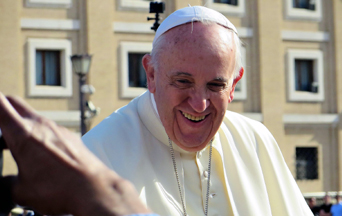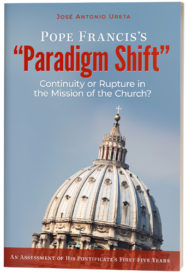
In his book, Pope Francis’s “Paradigm Shift”: Continuity or Rupture in the Mission of the Church?, José Antonio Ureta spells out many reasons for faithful Catholics to be concerned about the direction in which Pope Francis is taking the Church. Chapter five discusses the Pope’s acceptance of the modern idea that all religions are equal and therefore trying to convert others is “nonsense.” This excerpt illustrates his support for ideas that previous popes labeled as indifferentism.
✧ † ✧
The most visible manifestation of this deviation was the disturbing video portraying the pope’s January 2016 intentions for the Worldwide Prayer Network. This first video was a new initiative that was widely disseminated on social media. It featured a Buddhist, a Jew, a Catholic priest, and a Muslim taking turns by saying, “I confide in Buddha,” “I believe in God,” “I believe in Jesus Christ,” and “I believe in God, Allah.” They are followed by Pope Francis, who says: “Many think differently, feel differently, seeking God or meeting God in different ways. In this crowd, in this range of religions, there is only one certainty we have for all: We are all children of God.”1 Then, the pope gave the month’s prayer intention, “that sincere dialogue among men and women of different faiths, may produce fruits of peace and justice.” At the same time, each of the religious representatives presented a symbol of their respective creed. The final scene shows those symbols together. The arrangement places the Buddha statue in the highest position, below which is placed, the masbaha (Islamic prayer beads), with the Christ Child at the bottom, next to the menorah (the seven-branched candelabra of Judaism).
Eternal and Natural Law: The Foundation of Morals and Law

Order PRINT copy.
Pope Francis reportedly made two more disturbing statements that are consistent with the interconfessionalism promoted by this video. Both statements are found in his first celebrated interview with Eugenio Scalfari. The October 2013 conversation was transcribed by La Reppublica and republished in both L’Osservatore Romano and the Vatican’s web site. In it, the pope asserted problematically: “I believe in God, not in a Catholic God, there is no Catholic God, there is God.”2 The second statement is found later in the interview. Smiling at the idea of trying to convert the atheistic reporter, the pope said: “Proselytism3 is solemn nonsense, it makes no sense. We need to get to know each other, listen to each other and improve our knowledge of the world around us.”4
* * *
José Antonio Ureta’s book is a startling and disturbing assessment that should be read by every person who is concerned about the changes that Pope Francis is trying to force upon the Church. Purchase the book through the TFP Store or download it at no charge by using the link below.
Purchase the book, Pope Francis’s “Paradigm Shift” here
Free Download Pope Francis’s “Paradigm Shift” here
Footnotes
- Pope’s Worldwide Prayer Network, “Inter-religious Dialogue,” Holy Cross TV, Jan. 8, 2016, https://www.youtube.com/watch?v=XODAb0ImTKg.
In addition to the final scene’s disturbing symbolism, there are three serious errors in this short text:
(1) The statement that all men are “children of God.” Fr. Ignace de la Potterie wrote: “Divine sonship is always a gratuitous gift of grace and cannot preclude grace bestowed gratuitously in baptism and recognized and embraced in the faith.” Ignace de la Potterie, “Men Are Not Born Sons of God. They Become So,” 30Days, 12–2009, http://www.30giorni.it/articoli_id_22029_l3.htm;
(2) One can seek God in various ways. However, one cannot “find God in many ways.” There is only one way to find God and that is in the one, true, and revealed religion, the Holy Roman Catholic Church, founded by Our Lord Jesus Christ;
(3) There is not just “one certainty for all.” There are many other religious certainties. They are obtained both by reason and by the true faith. They start with the existence of a personal God (which Buddhists deny). Canon 2, “On Revelation,” of the First Vatican Council’s Dogmatic Constitution Dei Filius, decreed, “If anyone says that the one, true God, our creator and lord, cannot be known with certainty from the things that have been made, by the natural light of human reason: let him be anathema.” Vatican Council I, Dogmatic Constitution Dei Filius, Apr. 24, 1870, can. 2, no. 1, in Norman P. Tanner, SJ, ed., Decrees of the Ecumenical Councils (Washington: Georgetown University Press, 1990), 2:810, https://www.ewtn.com/library/councils/v1.htm#4. - Simone Sereni, “‘God Is Not Catholic’: And According to Some, Neither Is the Pope,” Aleteia, Oct. 7, 2013, https://aleteia.org/2013/10/07/god-is-not-catholic-and-according-to-some-neither-is-the-pope/.
- From the context of this interview and other uses he makes of the word, it follows that Pope Francis condemns proselytism not just in the word’s negative sense, namely, the use of dishonest means to attract new co-religionists, but even in the word’s legitimate meaning, that is, the apostolate, missionary activity aimed at bringing a person from another religion or none to the Catholic Church, using only loyal and persuasive means. Incidentally, in this second and entirely correct meaning, proselytism was wrongly condemned in the 1993 joint Catholic-Orthodox Balamand Declaration and in the Joint Declaration of Pope Francis and Patriarch Kirill in Havana in February 2016. The latter document improperly condemned uniatism for that very reason: “It is today clear that the past method of ‘uniatism,’ understood as the union of one community to the other, separating it from its church, is not the way to reestablish unity.” “Joint Declaration of His Holiness Pope Francis and His Holiness Kirill, Patriarch of Moscow and All Russia,” Feb. 12, 2016, no. 25, https://w2.vatican.va/content/francesco/en/speeches/2016/february/documents/papa-francesco_20160212_dichiarazione-comune-kirill.html.
- Scalfari, “Così cambierò la Chiesa”; Jimmy Akin, “Did Pope Francis Just Say That Evangelization Is ‘Nonsense’? 8 Things to Know and Share,” National Catholic Register, Oct. 1, 2013, http://www.ncregister.com/blog/jimmy-akin/did-pope-francis-just-say-that-evangelization-is-nonsense-8-things-to-know.

